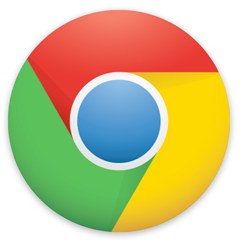More Danny Sullivan: What explains all these bad posts about Google Chrome–which appear to be sponsored by Google Chrome?
Tag Archives | Google Chrome
Is the Firefox Era About to End?
 Computerworld’s Gregg Keizer reports that Web analytics company StatCounter thinks that Google’s Chrome will pass Firefox to become the world’s second most popular browser by December. (Internet Explorer remains the top dog, but its share, which once surpassed ninety percent, continues to drop.)
Computerworld’s Gregg Keizer reports that Web analytics company StatCounter thinks that Google’s Chrome will pass Firefox to become the world’s second most popular browser by December. (Internet Explorer remains the top dog, but its share, which once surpassed ninety percent, continues to drop.)
If the trends established thus far this year continue, Chrome will come close to matching Firefox’s usage share in November, then pass its rival in December, when Chrome will account for approximately 26.6% of all browsers and Firefox will have a 25.3% share.
Those numbers are eerily close to the stats at Technologizer for the past month: 26.05 percent of you have used Chrome to visit us, and 25.06 percent have used Firefox. Chrome is already the top browser amongst youse guys: Safari is #3 at 20.31 percent, and IE is #4 at 19.07 percent. (We’re small enough that there’s plenty of flux in the rankings; things could be different next month.)
27 comments
Google Doubles Down on “Ten Blue Links”

Google's Johanna Wright shows off the new Search by Image feature.
“I don’t need ten blue links — just give me the answer!”–Bing Search Blog post, October 2010
“Yahoo Vows Death to the ’10 Blue Links'”–IDG News article, May 2009
It’s funny: Google’s competitors spend a lot of time explaining that “ten blue links”–the traditional search results that we’ve known since the dawn of search engines–are annoying and/or obsolete. But I haven’t noticed any consumer uprising over them, or a mass exodus from search engines that use them. Actually, I suspect that any company that rails against “ten blue links” would cheerfully swap places with Google if it had the chance, dependent on blue links though Google may be.
And at Google’s Inside Search event today, thee was lots of news–but the company didn’t seem to be on a mission to deemphasize traditional results pages. Instead, most of the news was about making the blue links more useful–getting you to them more quickly, in more ways, then letting you get past them and onto a Web page that provides the information (Google would probably say “knowledge” rather than “information” which you’re looking for.
4 comments
iChromy: An Alternative iPad Browser With Chrome Envy
![]() Google’s not bringing the Chrome web browser to the iPad anytime soon, if ever, so app maker Diigo is trying to fill the void with iChromy.
Google’s not bringing the Chrome web browser to the iPad anytime soon, if ever, so app maker Diigo is trying to fill the void with iChromy.
The free alternative iPad browser, which launches in the App Store today, mimics the Chrome aesthetic. Tabs appear at the top of the screen, and a single bar handles web addresses and searches, just like Chrome’s omnibar. There’s even a star-shaped bookmark button to the right of the URL bar, just like Chrome.
Chrome flattery aside, iChromy’s greatest asset is stability. When tab overload threatens to crash the browser, iChromy quietly shifts memory away from background tabs that you haven’t opened in a while. These pages reload when you access them again, but it’s a small price to pay for having lots of open tabs with minimal crashes. I’ve been playing with a preview version of iChromy on an original iPad for a few days, and it’s far better at avoiding crashes than my previous iPad browser of choice, Atomic Web Browser.
11 comments
Early Chrome Build Lets You Kill the URL Bar
 Google may take minimalism to the extreme with future versions of the Chrome browser.
Google may take minimalism to the extreme with future versions of the Chrome browser.
As ConceivablyTech points out, the latest Chrome Canary build — an early-stage version that precedes developer and beta versions — includes the ability to hide the URL bar. To turn on this feature, enter “about:flags” in the URL bar, enable “Compact Navigation,” relaunch the browser, right-click any tab and click “Hide the toolbar.” (Don’t be shy; you can install Canary side-by-side with other Chrome versions.)
Once you do this, the URL bar will disappear, providing an extra 30 pixels of room to browse. The forward button, back button and tools icon nest within the same strip of space as open tabs. Clicking an open tab creates a drop-down URL and search bar that’s much shorter than screen width.
3 comments
John Gruber on Chrome and Android
Chrome feels like Google’s natural platform — all web, only the web. Android feels like an independent Google subsidiary.
No comments
The Era of One-Size-Fits-All Products
 I stopped using Google’s Chrome as my primary browser today. I did so with regret, and hope to be back. But in recent days, some of the Web sites I use most–WordPress.com, Twitter, and Facebook–have stopped working properly in Chrome. I’m uncertain of why, but the most likely explanation is that they’re reacting badly to the newest version of Chrome, which, like all Chrome updates, was installed automatically on my computer. So I’m switching for the time being to Safari, where all those sites behave like they should.
I stopped using Google’s Chrome as my primary browser today. I did so with regret, and hope to be back. But in recent days, some of the Web sites I use most–WordPress.com, Twitter, and Facebook–have stopped working properly in Chrome. I’m uncertain of why, but the most likely explanation is that they’re reacting badly to the newest version of Chrome, which, like all Chrome updates, was installed automatically on my computer. So I’m switching for the time being to Safari, where all those sites behave like they should.
There are plenty of arguments for auto-updates of the type seen in Chrome. For one thing, they’re a good way to stomp out security vulnerabilities as quickly as possible, as widely as possible, once they’re discovered. But they also make it harder for anyone who’d rather decide for himself or herself when to move to a new version of the browser. (For the record, it’s possible to shut off auto-updating, although it’s not exactly obvious how to do it.) Basically, Google appears to think that everyone should use the current version of Chrome (except for bleeding-edge types: they should use the current beta). It’s not going to make things easy for those of us who’d prefer to opt out.
6 comments
Rumors of Firefox’s Death are Greatly Exaggerated
 There’s misguided analysis out there this week (see here, here, and to some extent here for examples) on how supposedly Firefox is dead or in trouble. Better stop the presses: it sure isn’t happening yet. In the first 24 hours following the browser’s official release, consumers have downloaded it more than 4.7 million times, double the rate for Microsoft’s Internet Explorer 9 debut last week. Downloads continue at a fairly torrid pace — you can follow here.
There’s misguided analysis out there this week (see here, here, and to some extent here for examples) on how supposedly Firefox is dead or in trouble. Better stop the presses: it sure isn’t happening yet. In the first 24 hours following the browser’s official release, consumers have downloaded it more than 4.7 million times, double the rate for Microsoft’s Internet Explorer 9 debut last week. Downloads continue at a fairly torrid pace — you can follow here.
Firefox 4’s success is evidence of the fact that consumers are still looking past Microsoft when it comes to browsers. According to NetApplications, Internet Explorer’s market share is now down to 57 percent. IE has been on a consistent decline for the past several years, and the upstart success of Chrome (which now has 11 percent of the market), and Firefox (at about 22 percent), show that consumers are ready for life post-Microsoft.
One comment
Chrome’s New Icon: Simpler, Homelier
![]() Big news from logoland: Google has simplified Chrome’s icon. It no longer looks quite as much like Simon, but still has the world’s most popular color scheme.
Big news from logoland: Google has simplified Chrome’s icon. It no longer looks quite as much like Simon, but still has the world’s most popular color scheme.
“Redesigning the icon was very much a group effort,” says a post on the Chrome blog, and to my eye, that’s obvious: It looks like it was designed by a committee. Which is true to Google’s personality, I guess–but I prefer the Susan Kare approach.
6 comments
Showdown: Chrome (Beta) vs. Firefox 4.0
 With new versions scheduled to be released for these two popular web browsers, many of us are rethinking where our loyalties lie. Should we go with the Google Chrome (Beta) or Mozilla Firefox 4.0? Is it worth the upgrade, or is it time to try something new? Here’s a list of the new and upgraded features to make your decision easier.
With new versions scheduled to be released for these two popular web browsers, many of us are rethinking where our loyalties lie. Should we go with the Google Chrome (Beta) or Mozilla Firefox 4.0? Is it worth the upgrade, or is it time to try something new? Here’s a list of the new and upgraded features to make your decision easier.
Release Date:
Google Chrome (Beta): Beta version available; Those using Chrome will be updated soon.
Mozilla Firefox 4.0: Web and mobile browser expected mid-to-late March. [NOTE: A beta version is available.]
Point Goes To: Chrome. It’s available now, and we all know what happens with tentative dates.
